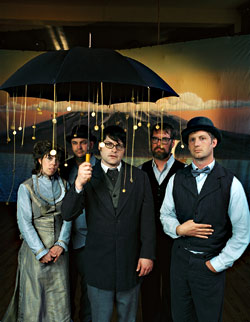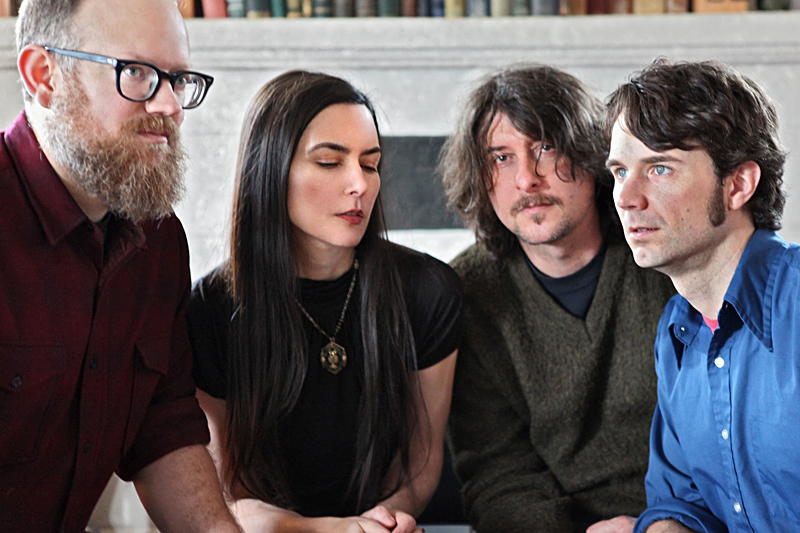When the Decemberists’ Colin Meloy sings, “Each feather, it fell from skin,” on “The Crane Wife 3,” the opening track off the band’s new disc, The Crane Wife, his oft-soaring voice dips in quiet ache, and the effect is mesmeric. The Portland-based indie-rock subjugators leapt from Kill Rock Stars to Capitol last year, and, counterintuitively, their major-label debut and fourth full-length is an epic song cycle based, in part, on a centuries old Japanese folk tale. You wouldn’t be alone if you initially thought, “Oh, dear God, why?” but the 11 songs are relentlessly compelling, with intricate stories of love and war and blood and renewal. Much has been made of the influence such unlikely progenitors as Yes, Pink Floyd, and King Crimson seem to have had on the record, and the word “prog” has been bandied about like ‘shrooms at an Evergreen State College dorm party. But The Crane Wife is unexpectedly moving in its simplicity.
Of course, it all could have been rot. “It’s an ambitious record, and we were just as likely to fall on our face as we were to make it out OK,” Meloy says by phone before departing on the North American tour that will bring the Decemberists and their glockenspiels to the Paramount. “The story is really simple in a way that only stories that have been passed down generation to generation through some ancient oral tradition can be. As a consequence, it’s also a little confusing. The Crane Wife weaves this amazing cloth in her room, and the neighbor suggests that her husband make her weave more, so the husband looks in on her. [She turns back into a crane and flies away.] The lesson isn’t really that clear. I can’t tell if it’s not to be greedy or not to peek in on your wife,” he says and laughs.
Meloy wrote each song on The Crane Wife, and while Rolling Stone lauded the disc, its legendary music writer, Robert Christgau, noted dryly that Meloy doesn’t say “twenty-five” when he can say “five and twenty.” Yet the record’s most evocative lines, such as “We’ll fill our mouths with cinnamon” off the closer, “Sons and Daughters,” are easy in their grace. I point out that critics sometimes overplay the “Victorian factor” in Meloy’s work and he agrees, though understands their point. “On The Crane Wife, I wasn’t so focused on doing verbal, alliterative acrobatics. I think in other records, I’ve really been into crunching words, making these lines that your tongue likes to trip over. They’re fun to read and to sing, but on this record, I was intent on getting a story across in a very simple yet poetic way.”
Producers Tucker Martine and Death Cab for Cutie’s Chris Walla, both known for their studio alchemy, helped Meloy and his venerable bandmates, Chris Funk (guitar, bouzouki), Jenny Conlee (Hammond organ, accordion), John Moen (backing vocals, percussion), and Nate Query (upright bass, electric bass) shape what could have been a Moog-laden contrivance into a contained sonic masterwork. “When I finished the demos, I had no idea what to do with them,” Meloy says. “To me, they were the weirdest collection of songs I’d ever written. I wrote to everyone [Walla, Martine, and the band] and said, ‘I am so nonplussed.’ Walla wrote back and said this was a complicated project and that we needed to set up a sequence and stick with it. He sequenced the demos, and it’s pretty close to the sequence on the record.” As a result, “The Crane 3” appears first and threads the narrative in unexpected ways. “Also, Walla pointed out that all of our prior records started in the key of E, and if we’d opened with ‘The Island,’ like we almost did, this one would have started in E, too,” he says with a laugh.
When asked if the Decemberists have any Spinal Tap moments from previous tours, events that were awful at the time but hilarious in retrospect, Meloy recalls, “On our first national tour, we played in Chicago, and the club got struck by lightning. The funny thing is, the day before, we played Madison, and there’d been a tornado warning. Thankfully, we were playing in the basement of a church. But we made it through all right. Our mettle was being tested.”








